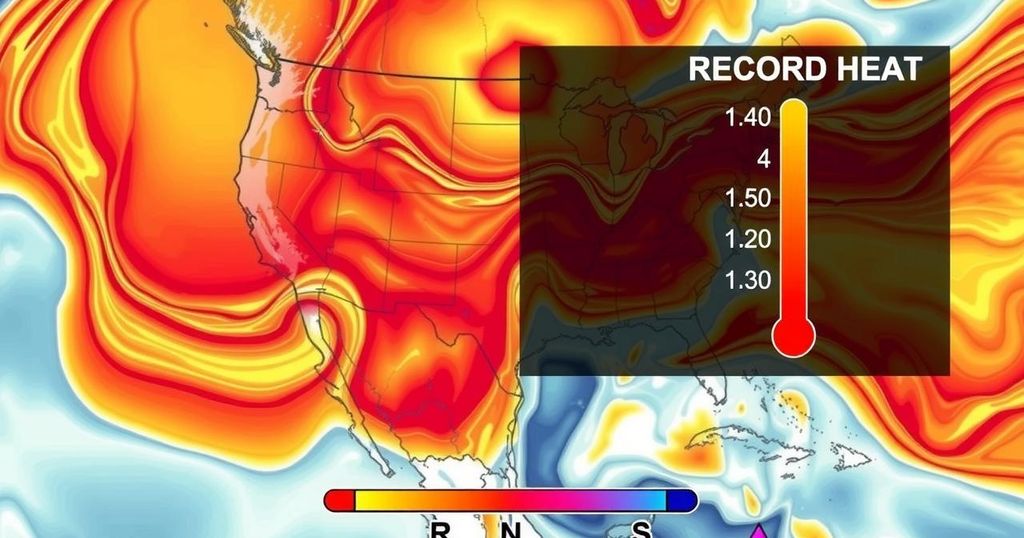2024 Set to be Hottest Year: Urgent Climate Action Required

Data projections indicate that 2024 is set to become the hottest year on record, with average temperatures exceeding 1.5°C above preindustrial levels. This trend raises urgent concerns regarding climate action in light of rising CO2 emissions and extreme weather events, such as severe wildfires and hurricanes, which have resulted in significant economic losses. The urgency for effective climate adaptation measures is underscored by the alarming environmental changes and their repercussions on vulnerable populations.
This year is poised to be the hottest on record, according to recent data from the EU’s Copernicus Climate Change Service. The average global temperature for November was recorded at 1.62°C above preindustrial levels, contributing to an expected annual average of 1.60°C for 2024. This surpasses last year’s record of 1.48°C, marking a significant milestone in the escalation of the climate crisis.
Samantha Burgess, Deputy Director at C3S, stated, “We can now confirm with virtual certainty that 2024 will be the warmest year on record and the first calendar year above 1.5°C. This does not mean that the Paris Agreement has been breached, but it does mean ambitious climate action is more urgent than ever.”
The Paris Agreement aims to keep global warming below 1.5°C over longer periods, rather than single years. Nonetheless, the situation appears increasingly precarious, with rising CO2 emissions anticipated for 2024 despite global commitments to reduce fossil fuel dependence. Significant reductions, around 45% by 2030, are vital to maintain the 1.5°C target, yet recent discussions, such as those at COP29, failed to yield actionable solutions.
Extreme weather events—exacerbated by climate change—are becoming more evident, with severe heatwaves, intense storms, and flooding occurring globally. Particularly harsh wildfires devastated regions in North and South America in 2024, with the Copernicus Atmosphere Monitoring Service reporting unprecedented intensity in areas such as the Pantanal wetlands and parts of the Amazon. Mark Parrington, a senior scientist at Cams, noted the historic scale of the 2024 wildfires, particularly citing devastating impacts in Bolivia and Canada.
The economic repercussions of these extreme weather conditions are escalating, with estimates from Swiss Re indicating a 6% increase in losses, reaching $320 billion—25% above the decade’s average. Natural disasters like Hurricanes Helene and Milton exacerbated these insured losses, alongside unprecedented flooding incidents. The report highlights that less than half of the total losses were insured, leaving vulnerable populations inadequately protected. Swiss Re emphasized, “Losses are likely to increase as climate change intensifies extreme weather events, while asset values increase in high-risk areas due to urban sprawl.”
As climate change continues to escalate, implementing adaptation strategies such as building resilient infrastructure becomes imperative. Effective measures including dykes, dams, and flood gates are significantly more cost-efficient than rehabilitation after disasters occur.
As global temperatures rise, the effects of climate change become increasingly pronounced, leading to more frequent and severe weather events. According to the Copernicus Climate Change Service, the year 2024 is anticipated to set alarming records in terms of heat, with profound implications for ecosystems, weather patterns, and human livelihood. The Paris Agreement aims to combat global warming, but current trends indicate that CO2 emissions continue to rise, endangering targets set to limit temperature increases. The escalating frequency and severity of extreme weather, notably wildfires and hurricanes, have also strained economic resources and highlighted the urgent need for effective climate adaptation strategies.
The data unequivocally suggests that 2024 will be the hottest year on record, underscoring the critical need for immediate and ambitious climate action. As global temperatures surpass significant thresholds, the urgency for enhanced adaptation and mitigation strategies cannot be overstated. The evidence of intensified extreme weather, coupled with rising economic losses, demonstrates the profound impacts of climate change on society and the environment. Without substantial efforts to reduce emissions and prepare for climate effects, the situation is poised to worsen.
Original Source: www.theguardian.com






